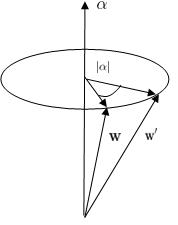Angular Momentum as a Generator of Rotations in 3D: Difference between revisions
No edit summary |
No edit summary |
||
| Line 1: | Line 1: | ||
{{Quantum Mechanics A}} | |||
Let us consider an infinitesimal rotation <math> \mathbf{\alpha} \!</math> directed along the axis about which the rotation takes place.We then have | Let us consider an infinitesimal rotation <math> \mathbf{\alpha} \!</math> directed along the axis about which the rotation takes place.We then have | ||
:<math> \mathbf{w}' = \mathbf{w} + \mathbf{\alpha} \times \mathbf{w} = \mathbf{w} + \delta\mathbf{w} </math> | :<math> \mathbf{w}' = \mathbf{w} + \mathbf{\alpha} \times \mathbf{w} = \mathbf{w} + \delta\mathbf{w} </math> | ||
Revision as of 16:41, 31 August 2011
Let us consider an infinitesimal rotation Failed to parse (SVG (MathML can be enabled via browser plugin): Invalid response ("Math extension cannot connect to Restbase.") from server "https://wikimedia.org/api/rest_v1/":): {\displaystyle \mathbf{\alpha} \!} directed along the axis about which the rotation takes place.We then have
- Failed to parse (SVG (MathML can be enabled via browser plugin): Invalid response ("Math extension cannot connect to Restbase.") from server "https://wikimedia.org/api/rest_v1/":): {\displaystyle \mathbf{w}' = \mathbf{w} + \mathbf{\alpha} \times \mathbf{w} = \mathbf{w} + \delta\mathbf{w} }
The changes Failed to parse (SVG (MathML can be enabled via browser plugin): Invalid response ("Math extension cannot connect to Restbase.") from server "https://wikimedia.org/api/rest_v1/":): {\displaystyle \delta \mathbf w} (in the radial vector Failed to parse (SVG (MathML can be enabled via browser plugin): Invalid response ("Math extension cannot connect to Restbase.") from server "https://wikimedia.org/api/rest_v1/":): {\displaystyle \mathbf w\!} of the particle) due to such a rotation is:
- Failed to parse (SVG (MathML can be enabled via browser plugin): Invalid response ("Math extension cannot connect to Restbase.") from server "https://wikimedia.org/api/rest_v1/":): {\displaystyle \delta \mathbf w=\mathbf{\alpha}\times \mathbf w}
so
- Failed to parse (SVG (MathML can be enabled via browser plugin): Invalid response ("Math extension cannot connect to Restbase.") from server "https://wikimedia.org/api/rest_v1/":): {\displaystyle \psi\left(\mathbf{w}+\mathbf{\delta} \mathbf{w}\right)=\left(1+\mathbf{\alpha}\cdot\left(\mathbf{w}\times\mathbf{\nabla}\right)\right)\psi\left(\mathbf{w}\right)}
The expression
- Failed to parse (SVG (MathML can be enabled via browser plugin): Invalid response ("Math extension cannot connect to Restbase.") from server "https://wikimedia.org/api/rest_v1/":): {\displaystyle 1+\mathbf{\alpha}\cdot(\mathbf{w}\times\mathbf{\nabla})}
is the operator of an infinitesimally small rotation. We recognize the equation
Therefore, the infinitesimal rotation operator is
This expression is only until the first order correction. The actual rotation operator is calculated by applying this operator N times where N goes to infinity. Doing so, we get the rotation operator for finite angle
In this form, we recognize that angular momentum is the generator of rotation. And we can write the equation relating the initial vector before rotation with the transformed vector as
This expression of the rotation operator is also valid when the rotation angle is not infinitesimal. What's more, this equation also implies that if we have a scalar instead of , it would be invariant. We can also calculate the effect of the unitary operator on the states:
- Failed to parse (SVG (MathML can be enabled via browser plugin): Invalid response ("Math extension cannot connect to Restbase.") from server "https://wikimedia.org/api/rest_v1/":): {\displaystyle \Rightarrow \psi'(r_0)=\langle r_0|\psi'\rangle=\langle r_0|e^{\frac{i}{\hbar}\mathbf{\alpha}\cdot\mathbf{L}}|\psi\rangle=\langle r_0'|\psi\rangle=\psi(r_0')}
This is the wavefunction evaluated at a rotated point.







